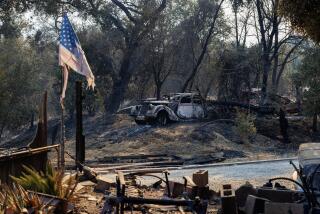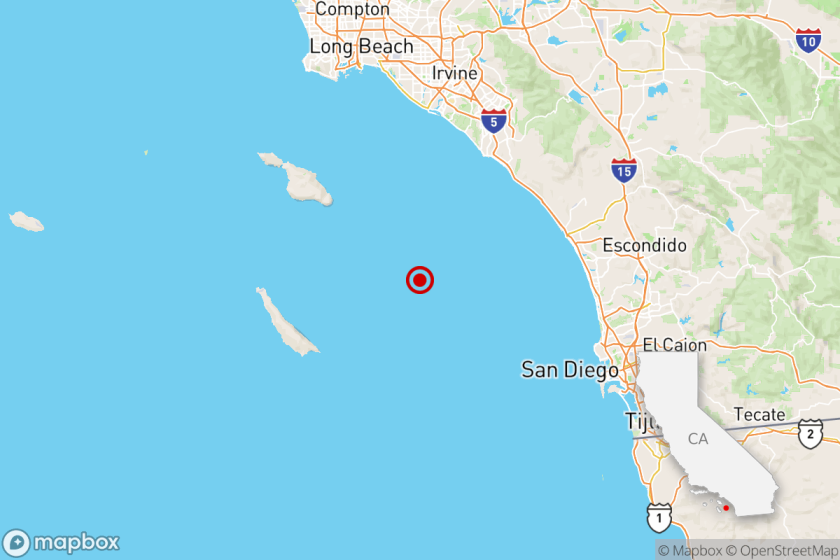Insurance Problems Are Latest Shock of the Quake : Aftermath: Some problems appear to be widespread. Valley policyholders form local consumer advocacy group.
As the struggle to rebuild after the Northridge earthquake continues, so do the battles hundreds of Southland victims are having with their insurance companies.
“We’re still very early in this whole process,” said Ina De Long, president of United Policyholders Inc., an Oakland-based nonprofit insurance consumer group. “Some people are just finding out they have serious damage.”
More than 3,000 San Fernando Valley residents attended six meetings conducted by United Policyholders last month. So many unresolved issues surfaced that a group of Northridge residents decided to form a new local organization, Community Assisting Recovery (CARe). The group announced Friday it had opened an office at 11145 Tampa Ave., Suite 19B, in Northridge. George Kehrer, formerly of United Policyholders, is CARe’s new executive director.
Starting June 1, CARe will conduct a series of “carrier specific” meetings for people whose homeowners’ insurance or earthquake coverage policies are with the same carrier. For a schedule of those meetings, call CARe at (818) 363-3062.
Here are questions and answers about several insurance problems that appear to be widespread:
* My insurance company isn’t responding to my calls and letters. What can I do?
*
The California Insurance Department adopted new, more consumer-oriented regulations last year that specify how insurance companies are supposed to handle claims.
Under the new regulations, “insurers are generally required to respond to written complaints from policyholders within 15 days,” said Nettie Hoge, head of the Insurance Department’s consumer services division.
The Insurance Department also has a consumer hot line you can call to register a formal complaint against your insurance carrier or simply get information at (800) 927-HELP. The toll-free number, however, doesn’t work in the 213 and 310 area codes. If you call from those areas or outside California, dial (213) 897-8921.
The hot line has received more than 10,000 calls so far, and policyholders have filed 700 formal complaints related to the quake, Hoge said.
If negotiation doesn’t work, you may have to turn to litigation. Several Los Angeles-area law firms specialize in real estate and insurance matters.
* The insurance adjuster who came to look at my damage was an auto-insurance adjuster from Iowa. Is this legal?
*
Unfortunately yes, Hoge said. California is one of several states that doesn’t require insurance adjusters to be licensed in any way.
“I know more adjusters with degrees in music than anything that’s building-related,” said De Long.
Moreover, “all too often, adjusters are promoted because they close a lot of claims and their average paid claim is low,” she said.
With more than 250,000 insurance claims related to the quake, companies have called in adjusters “who are clearly, clearly not qualified to handle these claims.”
* Should I worry about possible asbestos contamination from the quake?
*
“People are being told by adjusters, ‘Oh, you don’t have asbestos,’ but only a state-certified asbestos consultant can tell you for sure,” said George Kehrer of United Policyholders.
An inspection by a certified consultant typically costs between $200 and $300, he said, and your insurance company should pay for the report.
Asbestos consultants are listed in the yellow pages of the phone book.
* How can I stop my insurance company from pressuring me to accept a settlement I think is unfair?
*
“Insurers are prohibited from coercing people to take a settlement in any way,” Hoge said.
“That includes holding up a claim check or refusing to pay living expenses,” she added. “Anything that says to a person, ‘Oh God, I better settle or else.’ ”
The state Insurance Department has a free booklet, “A Guide to the Claim Process for Residential Property Losses,” which spells out all rights of policyholders. For a copy, call the department’s consumer hot line.
And get your own experts to look at your damage, said Bill Rake, president of the Greenspan Co., a Los Angeles firm that represents insurance claimants on a contingency basis.
“The carriers have begun to acknowledge that the damages are considerably greater than they first thought, and they are fighting tooth and nail to minimize everything they can,” Rake said.
“Every policyholder should have a structural engineer look at their property,” he warned. “There is more hidden damage in earthquakes than almost any other kind of disaster.”
De Long also recommends hiring a soils engineer.
“I know it sounds stupid, but people forget the earthquake came from the ground. The most common problem after an earthquake is soil instability, but it almost never gets addressed.
“It’s the biggest mistake people can make because a house will never be any stronger than the soil that’s supporting it,” she said.
A homeowner may not notice anything wrong for several months.
“Then doors and windows don’t open and close properly, floors start to squeak, and maybe you get a hump in one part of the floor,” said De Long.
* Why is my neighbor getting a much larger insurance settlement than I am when we had the same amount of damage?
*
Earthquake policies sold by different insurance companies can vary in many respects, especially when it comes to deductibles, or how much of their loss policyholders must pay themselves.
“People who start comparing the way their deductible is being handled with a neighbor who has a different carrier are only going to add to their confusion,” De Long said.
Western Insurance Information Service, an insurance trade group, supplies brochures about all types of coverage and can be reached at (800) 397-1679.
* What should I do with an insurance settlement check that is also payable to my mortgage holder?
*
This is a controversial issue that may end up being decided in court, Hoge said.
“Lenders said to us, ‘Look, the law is unclear and we think we have a right to these checks to protect our collateral.’ We’ve said we don’t think you are. But we can’t resolve the dispute by issuing a notice to the industry because it doesn’t have the force of law.
“Right now, we’re telling people to call our hot line and immediately say, ‘This is a dual-payee issue,’ and we’ll contact the insurer and the lender on their behalf and see what we can do. We’ve had a lot of success.”
* My insurance check says “Full and Final Payment” on it. What if I discover more damage later?
*
Check with your lawyer, De Long advises.
“I always caution people about signing anything that looks like a release or waiver,” she said. “It can create major problems for you down the road.”
She suggests asking your insurer to sign a letter saying that accepting the check doesn’t prevent you from filing another claim.
* I haven’t signed anything, but my insurance company says my claim has been closed anyway. Do they have to reopen it?
*
Yes, Kehrer said. “They can’t close your claim without your knowledge.”
He suggests calling the company and making it clear you know your rights. “You don’t have to ask them to reopen your claim--tell them.”
More to Read
Sign up for Essential California
The most important California stories and recommendations in your inbox every morning.
You may occasionally receive promotional content from the Los Angeles Times.










